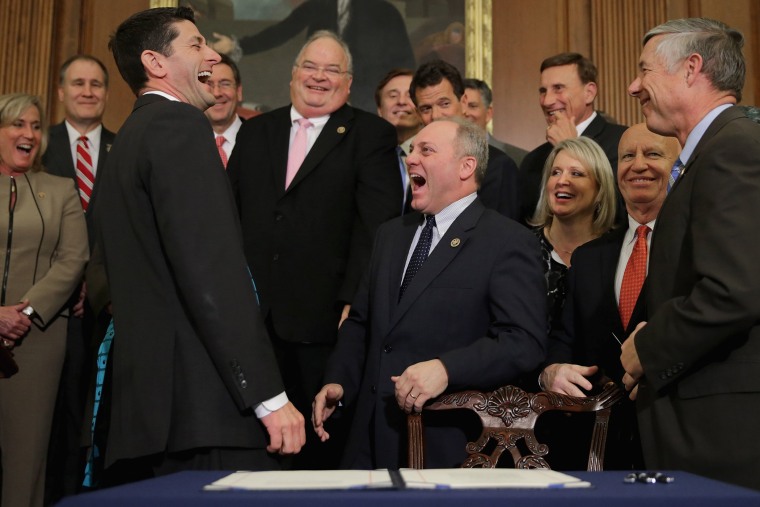At an event over the weekend, South Carolina Gov. Nikki Haley (R), who'll deliver her party's State of the Union response this week, made a curious boast about her congressional allies. House Speaker Paul Ryan (R-Wis.), the governor argued, "said that when he took his leadership role, things were going to change. How about the fact that they repealed Obamacare? Was that not fantastic?"
The comments left many confused. House Republicans voted last week for the 62nd time to repeal the Affordable Care Act, but that doesn't mean they succeeded. On the contrary, President Obama vetoed the repeal bill on Friday afternoon, issuing a statement to Congress that read in part, "Because of the harm this bill would cause to the health and financial security of millions of Americans, it has earned my veto."
Haley may have been impressed, and Republican lawmakers themselves may have had a grand time pretending to take Americans' health benefits away -- see the above photo -- but nothing has changed.
So, now what? If we're to believe the congressional GOP's rhetoric, the next step is the release of the long-awaited Republican alternative to the current health care reform law. On CBS's "Face the Nation" yesterday, host John Dickerson asked Speaker Ryan about this:
DICKERSON: You said you wanted the Republicans to offer an alternative to the president. One of the first things you did this year, though, was offer [an ACA repeal bill]. How is that an alternative? RYAN: It's not. That's why we have to come up with an alternative.
Evidently, that's easier said than done. The GOP's alternative has been in the works since June 2009 -- a mere six-and-a-half years ago -- and asked last week why he's moving forward with a repeal bill before the Republican alternative ready, Ryan told reporters with a smile, "Just wait."
Around the same time, the House GOP leadership quietly signaled just how long that wait is likely to be.
Politico reported that the Speaker's office is pushing Republicans to "go big on ideas" in the 2016 election cycle, but for now, it appears "those ideas might just remain, well, ideas."
Senior House Republican aides and lawmakers say they do not plan to hold votes on many of the agenda items the party plans to unveil -- such as a health care plan to replace Obamacare, or tax reform -- because of a tight legislative calendar over the next few months and the reality that none of the bills would be signed by the president, anyway.
The idea that Congress shouldn't work on bills that won't earn the president's signature might be more compelling if Congress hadn't just sent an ACA-repeal bill to the White House, knowing all the while that the legislation stood no chance of success. Indeed, the House Republican majority has spent roughly five years repeatedly working on measures that they knew would never receive Obama's support. Why change now?
As for the "tight legislative calendar," note that this has nothing to do with a busy work schedule -- Congress has very little on its to-do list for the rest of the year -- and everything to do with vacation time lawmakers have given themselves. In other words, "tight legislative calendar" refers to the limited amount of time members have given themselves for actual work.
If the House Republican majority wanted to give itself more time to do actual work, it could -- it's within the GOP's power to expand the "tight legislative calendar" by weeks or months. Party leaders simply prefer not to.
The end result suggests we won't see any real consideration of the Republicans' ACA alternative until 2017 -- at the earliest.
Postscript: The Washington Post published a piece last week saying it was "time for an Obamacare checkup," assessing how the law is performing along multiple metrics. The prognosis? "Despite much doom and gloom portended for years by the law's opponents, Obamacare looks surprisingly ... healthy," the Post reported.
